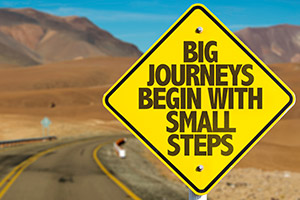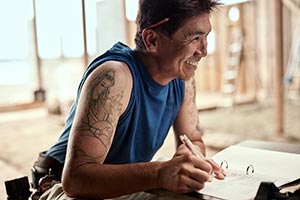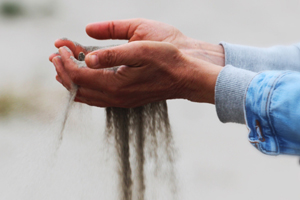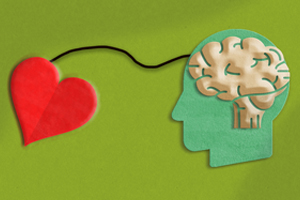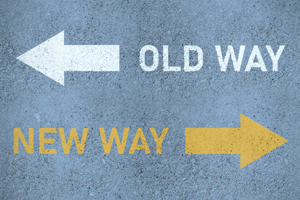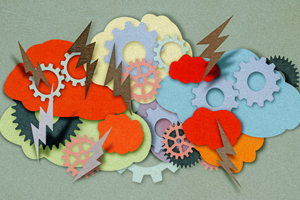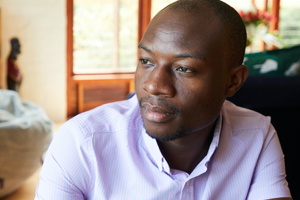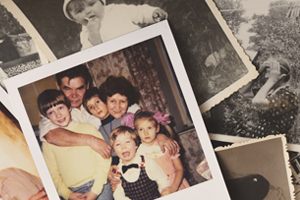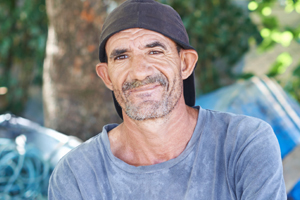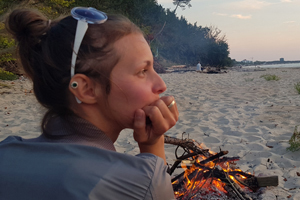
Inspiration For Your Journey
Welcome to Recovery Road, a new podcast from Hazelden Publishing. Here you'll find powerful thoughts, excerpts, and reflections from our most popular resources. These are the words, insights, and realizations from best-selling authors who have helped millions conquer substance abuse disorder. Now more than ever we need to find calm in the chaos, stay focused on self-care, and commit to long-term recovery. You are not alone. We are in this together. Join us on Recovery Road.
On Recovery Road, January is about beginnings; getting back to basics. It's about the power of powerlessness, the great "we" in our recovery and accepting ourselves and our addiction.
Accepting Ourselves and our Addiction
In his book First Year Sobriety: When All that Changes is Everything, Guy Kettelhack draws on the voices of women and men who are navigating the unknown territory of their first year of sobriety. This excerpt includes the personal accounts of Marcia and George, two people in recovery who still find themselves occasionally overwhelmed with rage. Listen.
In her book A Woman's Guide to Recovery, Brenda Iliff gives expert advice, caring support, and personal stories of women who have found their way out of the mess of addiction and into new lives marked by healing and recovery. This excerpt discusses the paradox of the First Step, exploring how we can find true power through admitting our powerlessness. Listen.
You are Not Alone: Joining "The Great We" of Recovery
In her book Mindfulness and the 12 Steps, Thérèse Jacobs-Stewart offers support for recovery, drawing on her personal experience and a wide range of knowledge in psychology and spirituality. In this excerpt, she points out that "we" is the first word of the Twelve Steps and makes a case for the importance of connection and community as spiritual resources for healthy recovery. Listen.
Back to Basics: What Does Unmanageable Mean?
In this excerpt from his book, Step Up: Unpacking Steps One, Two, and Three with Someone Who's Been There, bestselling author and sober alcoholic Michael Graubart explores the word unmanageability as it appears in Step One, and how our impulse to control everyone and everything is at the heart of our struggle with alcoholism and other addictions. Listen.
Step Twelve is when we start giving back and being of service. From transforming our lives through active spirituality to the adventure of reaching out, we're exploring Step Twelve this month on Recovery Road.
Twelve Ways to Revitalize Your Recovery
In this excerpt from the revised edition of his classic book A Gentle Path through the Twelve Steps, Dr. Patrick Carnes offers practical advice for revitalizing a recovery that may feel stalled or stuck and reminds us that the gifts of recovery are always meant to be shared. Listen.
Nothing Less than Love is Required
In their book Now That You're Sober: Week by Week Guidance from Your Recovery Coach, Earnie Larsen and Carol Larsen Hegarty offer practical advice and wise inspiration for the recovery journey. In this excerpt, we hear personal insight from James, an AA member who has had a tough go at life but now helps others hear and embrace the message and the miracle of recovery. Listen.
Service: The Adventure of Reaching Out
In his book Second Year Sobriety: Getting Comfortable Now That Everything Is Different, Guy Kettelhack explores growth and the challenges we often face in our second year of recovery. In this excerpt, we hear a personal story from Jack, a member of AA who is learning what acts of service can look like in recovery. Listen.
The Rich Rewards of Step Twelve
In his book Twelve Step Sponsorship: How It Works, author and sponsor Hamilton B. writes for both sponsors and sponsees about this important part of the program. In this excerpt he highlights the relational power that undergirds Twelve Step recovery and is the focus of Step Twelve: we find recovery with the help of others, and then we get to pay it forward. Listen.
The Active Spirituality of the Twelfth Step
In her book A Woman's Way Through the Twelve Steps, Dr. Stephanie Covington guides readers through the Twelve Step journey through the lens of women's perspective. In this excerpt, we learn what a spiritual awakening is and how it applies to us as we take the Twelfth Step. Listen.
There are many paths to conscious contact with a Higher Power of our understanding: from mindfulness meditation to daily reflective renewal. This month's Recovery Road offers us a few options to consider.
Mindfulness: A Path to Personal Growth
In her book, Find Your Light: Practicing Mindfulness to Recover from Anything, Beverly Conyers shows us how the practice of mindfulness, which includes deep acceptance of the present moment, can be a daily part of recovery and a path to a happier life. Listen.
New Every Morning: How to Remake Your Decisions Each Day
In her book Fearless Relationships: Simple Rules for Lifelong Contentment, Karen Casey offers a guide for living with more serenity and creating a world that will nurture us and our relationships. In this excerpt, Casey discusses how she starts her day with God. We see how doing this helps her have a positive attitude for the day ahead. Listen.
Practicing Presence: The Power in Meditation
In his book Practicing the Here and Now, Herb K. offers a framework for understanding and accessing the powerful gifts of prayer and meditation found in the Twelve Step journey of recovery. In this excerpt, Herb describes the practice of meditation, defining it as an intentional process that allows us to receive guidance that both informs and transforms our lives and relationships. Listen.
Conscious Contact: Finding Your Way Forward
In her book Mindfulness and the 12 Steps, Thérèse Jacobs-Stewart offers support for recovery, drawing on her personal experience and an impressive range of knowledge in psychology, spirituality, and the Twelve Steps. In this excerpt, we hear the author's own story of working with a spiritual advisor and how the invitation to prayer and meditation at the heart of Step Eleven helped her face a life-changing choice. Listen.
On Recovery Road in October, we learn how to sober up to our humanness, break the cycle of stress in our relationships and to simply keep moving forward.
In Undrunk: A Skeptic's Guide to AA, recovering alcoholic A.J. Adams shares insights and wisdom from his own story of skeptic spirituality, and the gifts of acceptance and willingness that he found along the path of recovery. In this excerpt, the author shares his two-step method for working Step Ten in the moments when it's most needed. Listen.
How to Break the Cycle of Stress in Relationships
In their book Rein in Your Brain: From Impulsivity to Thoughtful Living in Recovery, Cynthia Moreno Tuohy and Victoria Costello offer brain training techniques for breaking the cycle of compulsive thoughts and behaviors. In this excerpt, we are given a real-life scenario that shows how not communicating feelings can affect our relationships and daily life. Listen.
Step Ten: How to Sober up to Your Humanness
In his book, Drop the Rock: The Ripple Effect, Fred H. helps us explore Step Ten, and how the habits and practices that we build in a program of recovery create positive effects in us that ripple outward into our relationships and beyond. This excerpt discusses the importance of paying attention to our feelings as we practice Step Ten. Listen.
For decades, the book A Program for You: A Guide to the Big Book's Design for Living has helped millions of people understand and apply the Twelve Steps to their lives and find an authentic path to recovery. In this excerpt, the authors offer Step Ten as a pattern for growing into the promises Alcoholics Anonymous makes about how we will feel and what we will experience in recovery. Listen.
Reframe your thinking, let go of the life you planned, and plot a new path forward. You'll learn how to do all this and more on the September Recovery Road.
From Resentment to Forgiveness: Learning to Let Go
In Finding your Moral Compass: Transformative Principles to Guide You in Recovery and Life, Craig Nakken offers forty-one universal principles, paired as positive and negative counterparts, that guide behavior. In this excerpt, we see the emotional toll of holding on to resentment compared with allowing ourselves to forgive. Listen.
Beyond Blame: Repairing Relationships in Early Recovery
In his book Twelve Step Sponsorship: How It Works, author and sponsor Hamilton B. writes for both sponsors and sponsees about this important part of the program. In this excerpt he explores the practice of face-to-face relationship repair that is at the center of the Ninth Step. Listen.
In A Gentle Path Through the Twelve Steps, Dr. Patrick Carnes offers the Twelve Steps as a pattern of practices and habits that make lasting recovery possible. This excerpt offers advice for approaching the challenges of Step Nine that can help us feel less overwhelmed by the process. Listen.
Unapologetic Amends: Forgiveness and Step Nine
In her book Sane: Mental Illness, Addiction, and the Twelve Steps, Marya Hornbacher shares her own story of recovery to help readers explore how achieving sobriety can be complicated by co-occurring mental health disorders. In this excerpt, Hornbacher describes how the forgiveness she found at the heart of Step Nine can offer us a new vision of who we are and what we're capable of. Listen.
Responsibility: The Cornerstone of Recovery
In his book The Addictive Personality: Understanding the Addictive Process and Compulsive Behavior, Craig Nakken helps people understand the process of addiction as well as the progressive nature of the disease and how to be healthy and happy and sober. In the following excerpt, we see how taking responsibility for our actions and owning up to our mistakes can help us cultivate healthy relationships and grow in our recovery journey. Listen.
Personalization, envy, guilt and shame. This month's Recovery Road will help you overcome these feelings as well as build a solid foundation for your recovery ahead.
Choose Differently: Five Ways to Own Our Part
In her book When Reality Bites: How Denial Helps and What to Do When it Hurts, Holly Parker provides exercises and personal stories that can help us understand and accept the positive uses of denial and learn to move past it when it becomes counterproductive. This excerpt introduces five different ways people tend to point the finger and avoid responsibility in relationships. Listen.
The Trio of Unwelcome Feelings: Envy, Guilt and Shame
In her book The Next Happy, Tracey Cleantis offers a roadmap for letting go of a dream that isn't working and teaches us how to set realistic goals for finding a new way forward. This excerpt describes how envy, guilt, and shame—what Cleantis calls the "Trio of unwelcome feelings"—can get in the way of our progress. We don't have to let these emotions rule our lives. Listen.
For decades, the book A Program for You: A Guide to the Big Book's Design for Living has helped millions of people understand and apply the Twelve Steps to their lives and find an authentic path to recovery. In this excerpt, the authors describe the Program as a process of finding harmony with the activity and will of a Higher Power, which includes the work of setting things right with the people we've harmed. Listen.
Six Tips for Avoiding Personalization and Blame
In their book What Went Right, Dr. Michael G. Wetter and Eileen Baley introduce easy-to-understand principles and techniques for recognizing and intervening against self-defeating thought processes and improving self-esteem. This excerpt includes tips for avoiding personalization and blame—two unhealthy responses to feelings of guilt. Listen.
From understanding the difference between arrogance and humility to learning how to be great and small at the same time, this month's Recovery Road will set you on the path to becoming a better person.
Awakening Change: Build your Meditation Muscle
In her book The Recovering Body: Physical and Spiritual Fitness for Living Clean and Sober, Jennifer Matesa offers a guide to achieving physical recovery as part of our path to lifelong sobriety. This excerpt offers tips for meditation and can encourage us to create a healthy new habit. Listen.
Into Action: Become a Better Person
In his book Undrunk: A Skeptic's Guide to AA, A. J. Adams describes how joining Alcoholics Anonymous changed his preconceptions about recovery and what could work for him. In this excerpt, Adams describes what the program taught him about real humility as well as the type of action that produces change on the road to recovery. Listen.
Humility: How to Be Great and Small at the Same
In her book A Woman's Way Through the Twelve Steps, Dr. Stephanie Covington guides readers along the Twelve Step journey through the lens of women's perspective. In this excerpt, we learn how Step Seven can help us stay conscious and aware of our actions. Most of all, it lets us ask for help letting go of the results. Listen.
In Finding Your Moral Compass: Transformative Principles to Guide You in Recovery and Life, Craig Nakken outlines forty-one basic principles, paired as positive and negative counterparts, that guide our behavior. This excerpt explores the way arrogance can be tempered by self-awareness and honest humility. Listen.
Find gifts in disguise and healing magic on this month's Recovery Road.
Healing Magic: Make Reappearing Issues Disappear
In her book Fearless Relationships: Simple Rules for Lifelong Contentment, Karen Casey offers insightful advice on how to heal ourselves and mend our relationships. In this excerpt, Casey explains how improving our relationships involves and includes improving ourselves as well. Growth means accepting responsibility for how we—and our relationships—evolve. Listen.
Let Go and Let God: Are You Willing?
For decades, the book A Program for You: A Guide to the Big Book's Design for Living has helped millions of people understand and apply the Twelve Steps to their lives and find an authentic path to recovery. In this excerpt, the authors ask us to be honest about our "willingness" when it comes to recovery and challenge us to let go of the defects of character that can keep us stuck in old patterns and afraid of the future. Listen.
In her book A Woman's Way Through the Twelve Steps, Dr. Stephanie Covington guides readers through the Twelve Step journey through the lens of women's perspective—including her own recovery story. In this excerpt, Covington notes that seeing our patterns doesn't make them change. To do that we need to learn how to let them go. Listen.
Ready for Change: Step Six and the Beginning of Recovery
In his book Twelve Step Sponsorship: How It Works, author and sponsor Hamilton B. writes for both sponsors and sponsees about how to work the Steps together. In this excerpt he explores the heart of Step Six: whether we're ready to have our Higher Power take away the defects of character that we identified in Step Four and that we admitted to God, to ourselves, and to another human being in Step Five. Listen.
Sixth Step: Surrender and Trust
In their book, Drop the Rock: Removing Character Defects Bill P and Todd W study Steps Six and Seven. This excerpt focuses on Step Six, in which we "became willing to ask God to help us remove our defects of character." Listen.
Presence, purpose, and persistence. These are the core foundation of our recovery—and some of the wisdom, insight, and inspiration you'll find in this month's Recovery Road.
Meditation Monday: Emotional Support
A pair of short meditations selected from late May entries in two of Hazelden Publishing's popular meditation series of books: A Life of My Own and Today I Will Do One Thing. Today's Meditation Monday selections invite us to seek and find emotional support for our recovery. Listen.
Navigating Conflict with Safe Sounding Boards
In her book Conscious Service: Ten Ways to Reclaim Your Calling, Move beyond Burnout, and Make a Difference without Sacrificing Yourself, Elizabeth Bishop offers practical tools for self-connection and self-care. In this excerpt, she describes how to build supportive relationships before we need them. Tapping the insights and support of "Safe Sounding Boards" can help us navigate difficult situations without losing our cool or threatening our recovery. Listen.
Meditation Monday: A Little Help Won't Hurt
A pair of short meditations selected from late May entries in two of Hazelden Publishing's popular meditation series of books: A Day at a Time and If You Leave Me, Can I Come with You? Today's Meditation Monday selections challenge us to reach out when we need help and stay honest about reality in what we say and do. Listen.
Problem Solving in Seven Steps
In his book Passages Through Recovery: An Action Plan for Preventing Relapse, Terence Gorski describes six stages of challenge we face in moving from active addiction to sobriety. This excerpt offers a seven-step method for managing stress and solving problems during the stabilization stage of recovery. Listen.
Meditation Monday: Cultivate Calm
A pair of short meditations selected from mid-May entries in two of Hazelden Publishing's classic meditation series of books: Day by Day and Twenty-Four Hours a Day. Today's "Meditation Monday" selections invite us to cultivate patience, learn to avoid overreacting, and share the load with others. Listen.
How to Stop Self-Fulfilling Prophecies
In their book Rein in Your Brain: From Impulsivity to Thoughtful Living in Recovery, Cynthia Moreno Tuohy and Victoria Costello offer techniques for breaking the cycle of compulsive thoughts and behaviors. In this excerpt, the authors discuss "self-fulfilling prophecies"—how the pain we experience in relationships can lead us to repeat old patterns—and offer strategies for change. Listen.
A pair of short meditations selected from early May entries in two of Hazelden Publishing's popular meditation series of books: Easy Does It and Answers in the Heart. Today's Meditation Monday selections invite us to enter and enjoy this day of recovery with creativity, love, and action. Listen.
In her book Conscious Service: Ten Ways to Reclaim Your Calling, Move beyond Burnout, and Make a Difference without Sacrificing Yourself, Elizabeth Bishop offers practical tools for self-connection and self-care. In this excerpt, she challenges us to explore and celebrate what makes each of us great—and she's not interested in lies, or bragging, or puffed-up half-truths. Claiming our greatness is all about honesty. Listen.
Meditation Monday: Conquering Fear and Anxiety
Two short meditations selected from early May entries in three of Hazelden Publishing's popular meditation series of books: A Woman's Spirit and Walk in Dry Places. Today's Meditation Monday selections are gathered around the theme of conquering our fears and anxieties. Listen.
Join us in April for Meditation Mondays, an exploration in how to accept change, and how to let go of the life you planned so you can build a better future.
Toxic Positivity: When Being Too Positive Becomes a Negative
In her book The Next Happy: Let Go of the Life You Planned and Find a New Way Forward, Tracey Cleantis offers practical advice on how to heal from our losses and let go of the things and relationships that no longer work for us. In this excerpt, the author shares her personal experience of balancing real grief and authentic positivity. Listen.
Meditation Monday: Remember and Release
A pair of short meditations selected from late-April entries in two of Hazelden Publishing's popular meditation series of books: Walk in Dry Places and A Life of My Own. Today's Meditation Monday selections invite us to remember the past without sinking into regret, and practice releasing our impulses to control the present and future. Listen.
Sobriety, Serenity, and Stuff: The Sixth Tradition
In their book Living the Twelve Traditions in Today's World: Principles Before Personalities, Mel B. and Michael Fitzpatrick examine the history of each AA principle and how they remain relevant to recovery programs today. This excerpt explores the Sixth Tradition: An AA group ought never endorse, finance, or lend the AA name to any related facility or outside enterprise, lest problems of money, property, and prestige divert us from our primary purpose. Listen.
Meditation Monday: Loving Ourselves and Others
A pair of short meditations selected from mid-April entries in two of Hazelden Publishing's popular meditation series of books: In God's Care and Answers in the Heart. Today's Meditation Monday selections invite us regard ourselves with compassion and treat the people around us with love and care. Listen.
Twelve Signs of Misery Addiction
In her book When Misery is Company, Anne Katherine helps those of us who feel comfortable in our misery find a new path toward happiness. This excerpt reviews some common self-sabotaging patterns and offers ways we can be more mindful in our activities and begin to enjoy life more. Listen.
Three Strategies for Self-Care When Loss is Ambiguous
Bestselling Author Melody Beattie's The Grief Club blends healing wisdom and pragmatic guidance to help us face life's most difficult moments and do the work that allows us to move ahead. In this excerpt, Beattie describes the importance of claiming our own space for grief, and the challenge of detaching from feelings, behaviors, and people who aren't—and never will be—our responsibility. Listen.
Meditation Monday: Wisdom is a Gift
A pair of short meditations selected from early April entries in two of Hazelden Publishing's popular meditation series of books: A Life of My Own and Easy Does It. Today's Meditation Monday selections invite us to listen to the wisdom and insight other people share with us. Listen.
Do you know how to forgive? How to claim your power? How to prioritize the most important? Find answers to these questions and much more in this month's Recovery Road podcasts.
Why Recovery is All or Nothing
For decades, the book A Program for You: A Guide to the Big Book's Design for Living has helped millions of people understand and apply the Twelve Steps to their lives and find an authentic path to recovery. In this excerpt, the authors deliver the news that, when it comes to a Higher Power, recovery isn't about half measures or partial surrender. Listen.
Meditation Monday: Make Way for Hope
A pair of short meditations selected from late March entries in two of Hazelden Publishing's popular meditation series of books: Each Day a New Beginning and A Woman's Spirit. Today's Meditation Monday selections are gathered around the theme of letting go of unnecessary anger and making way for hope. Listen.
Reality Check: Find Peace Through Humility
In her book Waiting: A Nonbeliever's Higher Power, Marya Hornbacher shares her own journey of recovery and offers a fresh approach to cultivating a spiritual life. Anyone who may feel disconnected from traditional ideas of a higher power can use this book to explore the concept of faith. In this excerpt, Hornbacher writes about humility as an essential element of true spirituality. Listen.
Meditation Monday: Welcoming Change
Two short meditations selected from mid-March entries in two of Hazelden Publishing's popular meditation series of books: Today I Will Do One Thing and Day by Day. Today's Meditation Monday selections are gathered around the theme of accepting change and creating new habits. Listen.
Just Breathe: Two Techniques to Help You Relax
Relieve Stress: 20 Quick Techniques, by Dr. Katrin Schubert, is an accessible guide to coping with stressful situations in recovery and daily life. Selected from the exercises that comprise the book's how-to content, this excerpt offers a pair of step-by-step breathing techniques for calming anxiety and managing stress. Listen.
Meditation Monday: First Things First
A pair of short meditations selected from mid-March entries in two of Hazelden Publishing's popular meditation series of books: A Day at a Time, and Twenty-Four Hours a Day for Teens. Today's Meditation Monday selections invite us to prioritize our recovery and take each day as it comes. Listen.
Three Steps Toward Forgiveness
In their book What Went Right: Reframe Your Thinking for a Happier Now, Dr. Michael Wetter and Eileen Bailey offer insightful advice on how to change the self-critical stories in our minds. We can reframe our thinking to gain self-confidence and a more fulfilling life in recovery. This excerpt helps us realize that a wrong decision or misjudgment does not make us a bad person with a bad life. It only makes us human. Listen.
Meditation Monday: Start with Yourself
A pair of short meditations selected from early March entries in two of Hazelden Publishing's popular meditation series of books: Walk in Dry Places and Days of Healing, Days of Joy. Today's Meditation Monday selections are gathered around the theme of self-reflection, self-awareness, and sharing. Listen.
In her book A Woman's Way Through the Twelve Steps, Dr. Stephanie Covington explores the Twelve Steps through the lens of women's experiences with addiction and recovery. The following excerpt invites us to reconsider the word "powerless" as it's used in the First Step: "We admitted we were powerless over alcohol—that our lives had become unmanageable." Listen.
Watching our words, taking small steps, and practicing meditation: these are just a few of the topics in this month's line-up of powerful podcasts to help you in your recovery.
Meditation Monday: Help from Your Higher Power
Three short meditations selected from late February entries in three of Hazelden Publishing's popular meditation series of books: Easy Does It, In God's Care and A Woman's Spirit. Today's Meditation Monday selections are gathered around the theme of connecting with our Higher Power and keeping faith in the promises of recovery. Listen.
How to Live the Steps and Take Steps for Living
In his book, Drop the Rock: The Ripple Effect, Fred H. describes how the habits and practices that we build as we work a Twelve Step program of recovery create positive effects in us that ripple outward into our relationships and beyond. This excerpt focuses on the importance of understanding and embracing the Steps not as ideas to be learned but as activities that give shape to our lives. Listen.
Three short meditations selected from mid-February entries in three of Hazelden Publishing's popular meditation series of books: A Life of My Own, Today's Gift, and Twenty-Four Hours a Day. Today's Meditation Monday selections focus on releasing control of outcomes and finding serenity through acceptance and the assistance of our Higher Power. Listen.
Give and Take: Being Part of a Healthy Whole in Recovery
In her book The Recovering Heart: Emotional Sobriety for Women, Beverly Conyers helps us explore emotional sobriety, or healing, by addressing behaviors and feelings. In this excerpt, Conyers introduces the concept of mutual dependency as a practice to help healthy relationships grow—calling us to rethink independence, dependence, and codependence. Listen.
Meditation Monday: Patience Brings Peace
Three short meditations selected from mid-February entries in three of Hazelden Publishing's popular meditation series of books: Walk in Dry Places, Answers in the Heart, and Keepers of the Wisdom. Today's Meditation Monday selections are gathered around the theme of serenity and patience, especially as we interpret the things that happen to us and receive feedback from others. Listen.
Change Your Words to Change Your Thoughts
In their book What Went Right: Reframe Your Thinking for a Happier Now, Michael Wetter and Eileen Bailey provide easy-to-understand principles to help us recognize and interrupt self-defeating thought processes. This excerpt introduces the term must-erbations—a rigid thinking pattern that enforces unrealistic standards. Listen.
Meditation Monday: Good Trees Can Bear Good Fruit
Three short meditations selected from early February entries in three of Hazelden Publishing's popular meditation series of books: Answers in the Heart, Twenty-Four Hours a Day, and The Promise of a New Day. Today's Meditation Monday selections invite us to reflect on our essential goodness and how that quality can affect our actions and choices. Listen.
Why We Wait: Navigating Sex in Early Recovery
In her book Sex in Recovery: A Meeting Between the Covers, Jennifer Matesa uncovers the challenges real people encounter when navigating sex and romance while living in recovery. In this excerpt, we explore the recovery-supporting reasons behind avoiding romantic relationships during the first year of sobriety. Listen.
Meditation Mondays, fearless relationships, and the six essentials to achieving lasting recovery are a few of the powerful podcasts in this month's Recovery Road.
Meditation Monday: Honesty Every Day
Three short meditations selected from mid-January entries in three of Hazelden Publishing's popular meditation series of books: A Day at a Time, Walk in Dry Places, and Easy Does It. Today's Meditation Monday selections focus on simplicity, honesty, and living free from denial in recovery. Listen.
In his book, Destination Joy: Moving Beyond Fear, Loss, and Trauma in Recovery, beloved author and counselor Earnie Larsen explores ways we can bring greater love, acceptance, and belonging to our recovering lives. This excerpt details what he identifies as six "basic" attitudes that support healthy and joyful recovery. Listen.
Meditation Monday: Stay Positive
Three short meditations selected from early January entries in three of Hazelden Publishing's popular meditation series of books: God Grant Me, In God's Care and Days of Healing, Days of Joy. Today's Meditation Monday selections are gathered around the theme of positivity. Listen.
In his book The Spiritual Self: Reflections on Recovery and God, Dr. Abraham J. Twerski helps us understand the meaning of spirituality and he offers insight on how to nurture our relationship with God while in recovery. In this excerpt, we learn ways that we can work on our character defects in recovery. Listen.
Four Steps for Nurturing Your Value in Recovery
In their book Six Essentials to Achieve Lasting Recovery, Dr. Sterling T. Shumway and Dr. Thomas G. Kimball offer guiding principles that are key to long-term recovery. This excerpt describes "value nurturing," including examples of how this practice can help us shift from negative self-talk to positive hope in our ability to change and grow. Listen.
Meditation Monday: Patience is a Virtue
Three short meditations selected from early January entries in three of Hazelden Publishing's popular meditation series of books: Walk in Dry Places; If You Leave Me, Can I Come with You? and Day by Day. Today's Meditation Monday selections are gathered around the theme of patience. Listen.
Five Steps for Finding a Fresh Perspective
In her book Fearless Relationships: Simple Rules for Lifelong Contentment, Karen Casey offers guidance about what can help or hinder our relationships. In this excerpt, we explore the ways we can grow when we are willing to understand situations from a fresh perspective. Listen.
Meditation Monday: Face and Embrace Today
Three short meditations selected from early January entries in three of Hazelden Publishing's popular meditation series of books: Today's Gift, A Day at a Time, and The Promise of a New Day. Today's Meditation Monday selections are gathered around the theme of today. Listen.
Humility, celebrations, and self-care. These are a few of the topics in this month's line-up of podcasts.
Let Your Head Lead Your Heart: The One-Year Relationship Rule
In their book Now That You're Sober: Week-by-Week Guidance from Your Recovery Coach, Earnie Larsen and Carol Larsen Hegarty offer support, insights, and exercises for people in early recovery. In this excerpt, we learn why it is important to wait at least a year in recovery before beginning a new romantic relationship. Listen.
How Hanging On to Hurt and Resentment Harms Recovery
For decades, the book A Program for You: A Guide to the Big Book's Design for Living has helped millions of people understand the Big Book, Alcoholics Anonymous, and apply the Twelve Steps to their lives. In this excerpt, we learn about different ways that resentments can appear in our lives and how they can present a roadblock to our recovery. Listen.
Build Better Boundaries: Cats, Dogs, and Healthy Relationships
Anne Katherine, in her book Boundaries: Where You End and I Begin, explains the need for boundaries and how they can affect various aspects of our lives. This excerpt emphasizes the importance of communication in all of our relationships. Listen.
Humble, Not Meek: How to Open Up Step Seven
In Drop the Rock: Removing Our Character Defects, Bill P., Todd W., and Sara S. discuss the principles behind the Sixth and Seventh Steps, not only for understanding but for action—so we can transform our lives and our relationships in recovery. In this excerpt, we examine Step Seven, "Humbly asked Him to remove our shortcomings." Listen.
How to Get Unstuck in Recovery
In his book Passages Through Recovery: An Action Plan for Preventing Relapse, Terence Gorski explains the recovery process through six stages—transitioning from active addiction to sobriety. This excerpt describes the importance of conscious growth in our lives. It also compares two very different ways of coping with "stuck points" in recovery—approaches to problem solving that lead to very different results. Listen.
Four Methods for Self-Care at Work
In her book An Invitation to Self-Care: Why Learning to Nurture Yourself Is the Key to the Life You've Always Wanted, Tracey Cleantis explores how to improve self-care in many areas of life by applying seven key principles. In this excerpt, we learn ways we can incorporate self-care into our daily routines at work. Listen.
Celebration Anxiety: How to Handle Success in Recovery
In his book First Year Sobriety: When All That Changes Is Everything, Guy Kettelhack discusses the milestones and obstacles that are common in the first year of recovery. This excerpt explores the anxiety we may have around celebrations. Listen.
The Trend is Not Your Friend: Craving, Control, and Step One
Step Up: Unpacking Steps One, Two, and Three with Someone Who's Been There by Michael Graubart is a practical guide for people who wish to find or deepen their recovery through the Twelve Step program and who are working on the first three Steps. In this excerpt, we examine the First Step and what the word "unmanageable" means during active addiction. Listen.
From sponsorship advice to finding your moral compass, our November podcasts will give you much to be grateful for on your recovery journey.
"Any Time I Want:" How Addictive Thinking Distorts our Concept of Time
In his book Addictive Thinking: Understanding Self-Deception, Dr. Abraham J. Twerski explores the origins of addictive thoughts and offers hope to those of us seeking a healthy and rewarding life in recovery. In this excerpt, Twerski explains how we addicts may have a distorted concept of time and discusses why a "one-day-at-a-time" approach is key to long-term sobriety. Listen.
Willing or Willful? How Keeping an Open Mind Can Help in Recovery
In Finding Your Moral Compass: Transformative Principles to Guide You in Recovery and Life, Craig Nakken outlines forty-one universally accepted principles, paired as positive and negative counterparts, that guide our behavior and are tools for discovering options and making choices. In this excerpt, we learn the difference between willfulness and willingness. Listen.
Don't Go Away: Coping with and Healing from Trauma
In her book The Recovering Heart: Emotional Sobriety for Women, Beverly Conyers provides guidance on achieving emotional sobriety and self-acceptance. This excerpt explains the ways that trauma can affect our emotions and our lives, and how the defensive strategies we may use to protect ourselves from the pain of trauma can backfire and prevent us from healing. Listen.
The Not-So-Good Old Days: Leave the High Drama in the Past
In his book Second Year Sobriety: Getting Comfortable Now That Everything Is Different, Guy Kettelhack explores the growth and the challenges we often face in the second year of recovery. In this excerpt, we learn how it is common to miss having a bit of chaos in our lives. If we want our recovery to last, we must continue to be mindful and ground ourselves in the moment. Listen.
A Spark of Faith: Agnostics in AA
In his book The 12 Steps Unplugged: A Young Person's Guide to Alcoholics Anonymous, John R. interprets the philosophies and stories of the Big Book in straightforward language that speaks to regular people. Wherever you fall on the spectrum of faith, this excerpt can help you understand the spiritual aspect of AA's approach to recovery. Listen.
Nine Benefits of Healthy Self-Esteem
In their book What Went Right: Reframe Your Thinking for a Happier Now, Michael Wetter and Eileen Bailey offer practical techniques and principles to help us recognize self-defeating thoughts. In this excerpt, we explore the impact of accepting ourselves and letting go of our negative self-image. Listen.
Practice the Feeling Process: Tips on Finding Freedom
In her book When Misery Is Company: End Self-Sabotage and Become Content, Anne Katherine provides solutions for those of us who may fear allowing ourselves to have hope or to be happy. In this excerpt, we explore how understanding and processing our true feelings can lead to freedom from our past. Listen.
Repairing Relationships: Making Amends in Early Recovery
In his book Twelve Step Sponsorship: How It Works, author and sponsor Hamilton B. writes for both sponsors and sponsees about this important part of the program. In this excerpt he explores the practice of face-to-face relationship repair that is at the heart of the Ninth Step. Listen.
Inconvenient Recovery: The Gifts of Step Ten
It's tempting to think that the Twelve Steps are the on-ramp to a life of recovery—the things we have to do to get onto the easy road of contented sobriety. In this excerpt from the revised edition of his classic book A Gentle Path through the Twelve Steps, Dr. Patrick Carnes explains the significance of Step Ten—that the Steps are actually a pattern for life. They offer an ongoing set of practices and habits of heart and mind that we return to daily. Listen.
Telling the truth, caring for yourself, and staying on the sobriety highway: these are just a few of topics on your journey along Recovery Road in October.
Stay on the Sobriety Highway by Mapping the Route
In his book Addictive Thinking: Understanding Self-Deception, Abraham J. Twerski discusses the origins of addictive thoughts and offers hope to those of us in recovery who are seeking a healthy and rewarding life. In this excerpt, Twerski examines how we all may perceive time differently. We can refigure our concept of time and begin to understand the future in a new way. Listen.
Begin with Yourself: Loving-Kindness for life in Recovery
In her book A Kinder Voice: Releasing Your Inner Critics with Mindfulness Slogans, Thérèse Jacobs-Stewart shares tools for calming a self-critical mind. This excerpt introduces a Tibetan breathing meditation called tonglen. We can use this practice to develop more compassion and become willing to send as well as receive love and kindness in our lives. Listen.
How People Change: Six Stages of Transformation
In her book Addict in the Family: Support Through Loss, Hope, and Recovery, Beverly Conyers offers important lessons on love, detachment, and self-care for families who are dealing with addiction and codependency. This excerpt is for anyone who wants to understand how people change and what progress in recovery—or any significant life transformation—can look like. Listen.
Sex and Recovery: Telling the Truth Together
In her book Sex in Recovery: A Meeting Between the Covers, Jennifer Matesa argues that the language and practices of recovery are as appropriate to the bedroom as they are to the church basement meeting. Just like every other aspect of our recovering life, we're invited to approach sex and intimacy with courageous self-examination and humble honesty. Listen.
Let it Start with You: Break the Cycle of Family Addiction
In the book Unwelcome Inheritance: Break Your Family's Cycle of Addictive Behaviors, Lisa Sue Woititz discusses the generational trauma of addiction and explores how we can break the cycles that continue to harm our families. Woititz co-authors the book with her late mom, Dr. Janet Woititz, an early leader in the Adult Children of Alcoholics (ACoA) movement. This excerpt helps us imagine and embrace our personal role as a change-making bridge between our family's past and its future. Listen.
Two Ways to Improve Your Self-Care Routine
In her book A Sober Mom's Guide to Recovery: Taking Care of Yourself to Take Care of Your Kids, Rosemary O'Connor addresses issues that mothers face at all stages of their recovery. Whether you're a mom or not, you can use the wisdom offered in this excerpt to develop self-care routines and rituals that will help you build well-being and find hope for the future. Listen.
How to Reconnect to Your Self in Recovery
In her book A Woman's Way through the Twelve Steps, Dr. Stephanie Covington explores the Twelve Step program from a woman's perspective, but the invitation to self-connection in this excerpt applies to all of us, regardless of gender. Now that we are reclaiming ourselves from addiction, we need to ask, Who are we? What do we need and what do we want for our future? Listen.
Apparently Irrelevant Actions: Simple Steps to Reduce Cravings
In this excerpt from his book Craving: Why We Can't Seem to Get Enough, Dr. Omar Manejwala examines the "apparently irrelevant" choices we make that can either set us up for failure or help us succeed in avoiding a return to use. Using data and science, Dr. Manejwala shows how a combination of beliefs and behavior can reduce our cravings and help us maintain abstinence--the cornerstone of recovery. Listen.
Our September podcasts celebrate National Recovery Month with reflections on how to stress less, love more, and retrain your brain to reduce the need for control.
Let's Get Real: Two Myths and One Truth about Recovery
A Place Called Self: Women, Sobriety, and Radical Transformation by Dr. Stephanie Brown is an insightful guide that can help readers unravel painful truths and confusing feelings in the process of creating a true sense of self in recovery. In this excerpt, Brown defines recovery, addresses the myths surrounding it, and discusses the truths of the recovery experience. Listen.
We're Not Normal: Allergy, Addiction, and the Myth of Willpower
A Program for You: A Guide to the Big Book's Design for Living is an intensive study of the basic text of Twelve Step recovery—the Big Book, Alcoholics Anonymous. This excerpt offers insight on what it means to be allergic to alcohol or other addictive substances, and how "willpower" is an unhelpful myth when it comes to substance use disorder. Listen.
Time for a New Road: Mental Illness, Addiction, and That First Step
In her book Sane: Mental Illness, Addiction, and the 12 Steps, Marya Hornbacher opens the discussion of recovery from co-occurring addiction and mental health disorders. In this excerpt, Hornbacher discusses her early experience with the Twelve Step program and her struggle with Step One as someone who also deals with a mental illness. Listen.
Stop That, Start This: Two Essentials for Early Recovery
In his book The Addictive Personality: Understanding the Addictive Process and Compulsive Behavior, Craig Nakken discusses the genetic factors, cultural influences, and progressive nature of substance use disorders to help readers understand the process of addiction. In this excerpt, we explore two practices that are beneficial in the early stages of recovery: defining abstinence and developing positive rituals. Listen.
In their book Living the Twelve Traditions in Today's World: Principles Before Personalities, Mel B. and Michael Fitzpatrick celebrate the history and development of Alcoholics Anonymous and interpret the program for the twenty-first century. This excerpt discusses the very first Tradition and how its focus on humility and unity continues to guide decisions and solve problems within AA groups today. Listen.
Retrain Your Brain: How to Let Go of Controlling Behavior
In her book Rein In Your Brain: From Impulsivity to Thoughtful Living in Recovery, Cynthia Moreno Tuohy offers ten techniques that can help with the compulsive thoughts and behaviors that most of us still struggle with in recovery. In this excerpt, Tuohy discusses how control in relationships and addictions are similar, and how to develop different skills and behavior patterns to improve our relationships. Listen.
Easy to Read, Hard to Do: Steps One and Two for Skeptics
In his book Undrunk: A Skeptic's Guide to AA, A. J. Adams describes how joining Alcoholics Anonymous changed his preconceptions of the program. In this excerpt, Adams introduces the Twelve Steps to people in early recovery and discusses how he learned to navigate the first two Steps during his own journey. Listen.
You are Enough: How To Change a Negative Self-Image
In his book Addictive Thinking: Understanding Self-Deception, Dr. Abraham Twerski reveals how self-deceptive thoughts can threaten the sobriety of a recovering individual. We can use this excerpt to help us identify and sort through any distorted realities we have and correct negative self-images. Listen.
Stress Less: Two Techniques for Calming Anxiety
Relieve Stress: 5-Minute First Aid for the Mind, by Dr. Katrin Schubert, is a welcome guide to coping with stressful situations in recovery and daily life. Selected from the twenty exercises that comprise the book's how-to content, this excerpt offers a pair of step-by-step techniques for calming anxiety and managing stress. Listen.
From four ways to finding freedom from trauma to eight ways to uncovering joy, August Recovery Road episodes will ensure your recovery journey remains strong.
Hope Grows in the Recovery Greenhouse
In their book Six Essentials to Achieve Lasting Recovery, Dr. Sterling Shumway and Dr. Thomas Kimball have identified six principles that reinforce the Twelve Steps and that are key to maintaining lasting recovery. This excerpt compares recovery to a greenhouse and describes what we need to keep our recovery, and healthy relationships, flourishing. Listen.
Four Tips for Reducing Stress by Dealing with Feelings
In his book Feed Your Head: Some Excellent Stuff on Being Yourself, Earl Hipp offers a framework for recognizing and dealing with feelings that can come with uncertainty, loss, and crisis. This excerpt introduces techniques for reducing stress and gives specific tips to guide us through problem management. We can use these tools to help navigate the difficulties in recovery and our daily life. Listen.
In this excerpt from her book Recovering Spirituality: Achieving Emotional Sobriety in Your Spiritual Practice, psychotherapist Ingrid Mathieu shows us that we don't have to be stuck on unhelpful definitions of God. We can let go of images and attributes that don't serve our sobriety. We get to be free to choose our own conception of a Higher Power we can trust—one that helps us heal. Listen.
End Emotional Isolation: How to Reach Out and Receive Help
In the book Sober but Stuck, author Dan F. has compiled testimonials from people in recovery to remind us that we're not alone. These voices offer insight into issues that often act as barriers to our continued sobriety. In this excerpt, Matthew describes how he overcame his struggle to reach out, gained the courage to tell his story honestly, and received genuine help to move forward in his recovery. Listen.
Eight Techniques for Uncovering Joy Every Day
In her book Fearless Relationships: Simple Rules for Lifelong Contentment, author Karen Casey offers wise counsel about what helps and what hinders relationships. Drawing from her own life experiences and lessons learned the hard way, Casey provides tips and steps on how to practice gratitude throughout recovery. Listen.
Four Ways to Find Safety, Serenity, and Freedom from Trauma
Passages through Recovery by Terence Gorski presents an action plan for preventing relapse. Gorski describes six stages of recovery from addiction and offers advice for working through the challenges of each stage. In this excerpt, Gorski explains the effects of repressed memories and how working with others in a safe environment can help us process our feelings and be more honest in our recovery. Listen.
Letting Go and Letting God: Sobriety and Self-Will
For decades, the book A Program for You: A Guide to the Big Book's Design for Living has helped millions of people understand and apply the Twelve Steps to their lives and find an authentic path to recovery. In this excerpt, the authors guide us through the concept of giving up our self-will and letting our Higher Power take control. Listen.
Time Brings Change: How to Write Your Life's Next Chapter
The Grief Club, by Melody Beattie, offers powerful healing wisdom to help us through life's most difficult times. In this excerpt, Beattie shows us how we can acknowledge and work through the grief that comes with any kind of change. Those of us in early recovery are in transition all the time. Beattie's insights can help us manage these moments while also maintaining our sobriety. Listen.
Four "Cant's" and Four "Cans:" Dealing with Anger in Recovery
In their book Of Course You're Angry: A Guide to Dealing with the Emotions of Substance Abuse, authors Gayle Rosellini and Mark Worden help readers understand and manage the powerful emotions that often accompany early recovery. Anger won't go away on its own, and reasons to be angry won't disappear, but how we choose to process and act on our anger can and will change. That's the promise of recovery. Listen.
Dreams, decluttering and detoxing: our July podcasts will help you find meaning, mentors and more as you continue your recovery journey.
In The Next Happy: Let Go of the Life You Planned and Find a New Way Forward, author Tracy Cleantis discusses how important it is to pause, reflect, and then move forward in our lives when things don't go as planned. This excerpt reminds us that giving up on a certain dream does not make us a failure or a quitter. Letting go can be a healthy decision that allows us to change our perspective and develop new goals—to reach the next happy. Listen.
Questions and Answers for Recovery Beginners
In his book Step Up: Unpacking Steps One, Two, and Three with Someone Who's Been There, Michael Graubart shares a practical approach to the first three Steps. This excerpt addresses some of the common yet important questions and concerns we may have as newcomers in recovery. Listen.
Drop the Rock: Decluttering and Detoxing
Drop the Rock: Removing Character Defects by Bill P., Todd W., and Sara S. is an important book to have when approaching Steps Six and Seven—in which we become ready and then ask our Higher Power to remove our defects of character and our shortcomings. In this excerpt, we're told how we can clean our house and detox in other areas of our lives in preparation to have our defects of character removed. Listen.
Maintenance and Management: Boundaries in Recovery
In her book Boundaries: Where You End and I Begin, author and therapist Anne Katherine explains what healthy boundaries can look like. In this excerpt, Katherine gets us thinking about how our boundaries came to be and discusses how good boundaries need ongoing attention and maintenance. Listen.
Unhealthy and isolating rituals were part of our experience of addiction. Healthy rituals that connect us with others must be part of our recovery. The Addictive Personality: Understanding the Addictive Process and Compulsive Behavior, by Craig Nakken, describes the two-sided personality we developed through our addiction and offers insights that can help us navigate the journey of wholeness and recovery. Listen.
Open Invitation: Work the Program that Works for You
In First-Year Sobriety: When All That Changes Is Everything, author Guy Kettlehack gives insightful advice about how to approach life when we're new to sobriety. In this excerpt, he reminds us that there isn't one specific way to go through the program, or to do recovery itself. We're not right or wrong—there's only one requirement for membership in a Twelve Step program: the desire to stop drinking or drugging. Listen.
In her book The Recovering Heart: Emotional Sobriety for Women, best-selling author Beverly Conyers shares insight on achieving emotional healing by addressing our behaviors and feelings. In this excerpt, Conyers describes the benefits of having a therapist, sponsor, or a group to talk to as we work the program and progress in our recovery. Listen.
Twelve Step Tutorial: What a Sponsor Does
In his book Twelve Step Sponsorship: How It Works, author and sponsor Hamilton B. lets us in on some of the need-to-know information about what can seem like a mysterious part of the program. In this excerpt he offers a few basics about how sponsorship works, what a sponsor is for, and how this unique relationship helps newcomers to recovery find help and hope. Listen.
Help from All Sides: Finding Meaning in the Journey
Those of us in recovery have a unique lens when it comes to pain and trauma. We have a sense that we can learn from our suffering, but how do we actually do that? In his classic book A Gentle Path through the Twelve Steps, Dr. Patrick Carnes shows us how learning from our painful past can help us find meaning. Together with others, we can heal our hurting brains, find our spiritual power, and discover our life's purpose. Listen.
Our June podcasts will help you set boundaries, learn from relapse and find a friend in yourself—all critical skills on our journey to wellness.
Loving-Kindness: Finding a Friend in Yourself
In her book A Kinder Voice: Releasing Your Inner Critics with Mindfulness Slogans, Thérèse Jacobs-Stewart shares effective strategies to calm a self-critical mind. In this excerpt, we explore "loving-kindness practice"—training that can help rewire our brain to develop a kinder voice toward ourselves as we do the hard work of recovery. Listen.
Recovery and Your Physical Well-Being
In her book The Recovering Body: Physical and Spiritual Fitness for Living Clean and Sober, author Jennifer Matesa offers a guide to achieving physical recovery as part of our path to lifelong sobriety. In this excerpt, she shares her personal story of how physical activity helped her stop craving alcohol and find a sense of home for the first time. Listen.
Almost Mindful: Training Ourselves to Stay Present
In Almost Anxious: Is My (or My Loved One's) Worry or Distress a Problem? Dr. Luana Marques and Eric Metcalf offer a practical set of skills to help maintain our anxiety at a level that is "just right"—not too much and not too little. This excerpt provides techniques to "troubleshoot our mindfulness practice" to help us find more enjoyment in our daily lives. Listen.
In his book Destination Joy: Moving beyond Fear, Loss, and Trauma in Recovery, Earnie Larsen expertly and compassionately guides those who want a deeper understanding of recovery and their program. In this excerpt, Larsen introduces the three stages of recovery—addressing issues that could block our growth in recovery. Listen.
Embracing Doubt as a Spiritual Practice
In her book Waiting: A Nonbeliever's Higher Power, Marya Hornbacher shares her own journey to recovery and spiritual life as she explores spiritual concepts related to the practice of the Twelve Steps. In this excerpt, we explore how doubt can teach us spiritual strength. She explains how we can learn to wait through our doubt—keeping faith in ourselves and our recovery path. Listen.
Understanding Trauma and Anger: Setting Boundaries
Shock Waves: A Practical Guide to Living with a Loved One's PTSD by Cynthia Orange is a resource for learning to live with the scars of trauma and the "shock wave" effect of PTSD—along with effective responses to addiction and co-occurring disorders. In this excerpt, Orange discusses how anger can sprout from trauma. We discover how we can protect ourselves from toxic people and environments, which is essential for a healthy recovery. Listen.
Learn from Loss: Relapse as a Teachable Moment
In the book Now What? An Insider's Guide to Addiction and Recovery, William Cope Moyers shares his own story as a way to help others understand how addiction works and find hope in the practical promises of recovery, regardless of how hopeless the present moment seems. In this excerpt, Moyers offers a way to see even something as unwanted as relapse as a moment for learning and growth. Listen.
Relationship Revelation: Every Argument Is About Fear
A lifelong student of human relationships, best-selling author Karen Casey focuses her attention on what actions and behaviors help relationships flourish, and which hurt. In this excerpt from her book Fearless Relationships: Simple Rules for Lifelong Contentment, Casey reminds us that fear is at the center of every argument in any relationship—and teaches us how love can undo fear. Listen.
From the power of meditation to reflections on the early days of AA, our May podcasts will inspire you to move beyond addiction and thrive fully in recovery.
Inner Critic: Your Own Worst Enemy
In her book Conquering Shame and Codependency: 8 Steps to Freeing the True You, therapist and author Darlene Lancer offers an in-depth look at shame as a primary cause of codependency and addiction. This excerpt challenges us to examine our childhood—connecting the dots on how lingering past traumas can impact our adult lives. We learn about our inner critic and how we can develop empathy for the child we once were. Listen.
Purpose and Persistence: Moving Beyond the Limits of Addiction
In their book Six Essentials to Achieve Lasting Recovery, authors Sterling Shumway and Thomas Kimball identify six essential principles that reinforce the Twelve Steps and are key to lasting recovery. This excerpt focuses on how the early phases of recovery lay the groundwork for reclaiming our life's purpose, and for rebuilding our sense of achievement and accomplishment. Listen.
Practicing Presence: The Power in Meditation
In his book Practicing the Here and Now, Herb K. offers a framework for understanding and accessing the deep gifts prayer and meditation found in the Twelve Step journey of recovery. In this excerpt, Herb describes the practice of meditation, defining it as an intentional process that allows us to receive guidance that both informs and transforms our lives and relationships. Listen.
Logical Sense: Reaping the Benefits of Consequences
In his book What's Wrong with My Kid? When Drugs or Alcohol Might Be a Problem and What to Do about It, mental health and addiction recovery advocate George E. Leary offers a judgment-free guide to the warning signs of drug use or addiction in our kids. In this excerpt, Leary defines the difference between natural and logical consequences, and describes how their use can be teaching tools that prevent parent-child struggles while effectively addressing substance use. Listen.
The Joy of Step Twelve: Help Yourself by Helping Others
In her book Sane: Mental Illness, Addiction, and the 12 Steps, author Marya Hornbacher examines the Twelve Steps and the tough yet rewarding journey toward recovery from addiction and successful management of a mental health disorder. In this excerpt, Hornbacher discusses the vital importance of Step Twelve: "Having had a spiritual awakening as the result of these steps, we tried to carry this message to alcoholics, and to practice these principles in all our affairs." Listen.
In his book A Gentle Path through the Twelve Principles: Living the Values Behind the Steps, Patrick Carnes presents twelve guiding principles essential in long-term recovery. This excerpt is about the vital importance of commitment in a recovering life, and the task of training our brains to help us do this hard work rather than taking shortcuts that can sabotage early recovery. Listen.
A Story for You: Bill W. and the Beginning of AA
In his book The 12 Steps Unplugged: A Young Person's Guide to Alcoholics Anonymous, adolescent addiction counselor John R. helps us discover the hidden treasures of the Big Book. In this excerpt, the author compares his experience with that of Bill W., the co-founder of Alcoholics Anonymous, to help us connect with the basic messages of getting honest with ourself, accepting the help of others, and finding a relevant spiritual support. Listen.
Tradition Eight: Giving It Away
In their book Living the Twelve Traditions in Today's World, recovery veterans Mel B. and Mike F. guide us through the Twelve Traditions of Alcoholics Anonymous, and what they see as the key to the heart of the movement's lasting success: principles before personalities. This excerpt, focused on giving without payment and staying in one's own lane, provides a perspective on the core commitment to keeping peer-supported recovery free and nonprofessional. Listen.
Grace and Growth: There's no Finish Line to Recovery
In this excerpt from her book, Recovering Spirituality: Achieving Emotional Sobriety in Your Spiritual Practice, Dr. Ingrid Mathieu explores the cyclical nature of learning and growth, underscoring the hopeful and freeing reality that there is no finish line when it comes to recovery. Listen.
Acceptance and abundance are featured in April as we continue to learn about the ways we can ensure our recovery continues strong and with a positive impact on our lives.
Becoming Independent: Learning to Live Alone
Sandra Swenson, in her book Just Dandy: Living with Heartache and Wishes, shares her pain and struggles, strength and determination, as a series of crises—including her adult son's fight with addiction and her unexpected divorce—continue to unravel her world in unexpected ways. This excerpt is a refreshingly honest account of one woman's experience with heartache, acceptance, and rediscovery as she learns to navigate life on her own and finds new strengths and resiliency. Listen.
Recovery for Body, Mind, and Spirit
Undrunk: A Skeptic's Guide to AA by A. J. Adams is a perfect read for those of us who are in early recovery or who are having doubts about joining Alcoholics Anonymous (AA). In this excerpt, we hear how Adams's entire life changed—in body, mind, and spirit—after only one year in the program. Listen.
In the book A Balanced Life, Tom Smith offers guidance for the family and friends of a person with mental illness on how to support their loved one while maintaining emotional, mental, and spiritual balance in their own lives. In this excerpt, Smith discusses why we may have a hard time accepting the limited control we have over others' actions, and how acceptance can help us move toward greater personal peace and improved relationships. Listen.
You vs. the World: Learning to See Our Interconnectedness
In Finding Your Moral Compass: Transformative Principles to Guide You in Recovery and Life, therapist and addictions specialist Craig Nakken outlines forty-one spiritual principles that we can use to guide our behavior. In this excerpt, we learn how separateness can affect our daily lives in an unhealthy way, while connection with others provides opportunities for growth. Nakken also explains how finding the right community will help us progress on our road to recovery. Listen.
Finding Abundance in Financial Recovery
Those of us in recovery often have had fraught relationships with money. We know that our work includes settling both financial and emotional debts. In In this excerpt from her book Spent: Break the Buying Obsession and Discover Your True Worth, psychologist and author Sally Palaian outlines signs of financial health, describes how cleaning up our finances can lead to a sense of abundance, and explains how learning to be flexible and trusting is key to our inner peace in matters of money. Listen.
Get Your Loved One Back: Intervention as Hostage Negotiation
In their groundbreaking classic book Love First: A Family's Guide to Intervention, Jeff and Debra Jay provide clear steps for harnessing the power of family, friends, and professionals to create a better future with loved ones who have an addiction. In this excerpt, the authors apply insights from the science of hostage negotiation, teaching us how to consider the competing pulls of loss and gain that color every interaction with a person trapped in active addiction. Listen.
Strength in the Struggle: You Are Worth the Work
In her book Awakening Blackout Girl, survivor and victims' rights advocate Jennifer Storm shares information, tools, and resources for healing from sexual trauma while also in recovery from substance use. In this excerpt, she discusses the importance of self-awareness. We learn that mistakes are what lead to learning and growth, and that a setback does not mean you're on the verge of relapse. Listen.
It Takes a Family: Strength-Oriented Sobriety for Everybody
However you define "family," experts agree that we have the best chance of sustaining our recovery when the people we love most are involved in it—in a healthy way. In this excerpt from her book It Takes a Family: Creating Lasting Sobriety, Togetherness, and Happiness, Debra Jay offers guidance for those who love a person recovering from addiction. Listen.
From recommendations to improving your sleep and recovering your spirituality, to an action plan for relapses, our March podcasts will help keep your recovery going strong as we move into Spring.
An Invitation to Self-Care: The Many Faces of Self-Harm
In her book, An Invitation to Self-Care, bestselling author Tracey Cleantis identifies some of the unhealthy habits and behaviors in our daily lives and demonstrates how learning to nurture ourselves is a central part of living the lives we want. In this excerpt, Cleantis describes what self-care is by illustrating some of its opposites and shows how these actions can hinder our journey to recovery and our better selves. Listen.
Keep Bringing Your Body: Making the Most of Meetings
As Meredith Gould reminds us in her book, Staying Sober: Tips for Working a Twelve Step Program of Recovery, regular attendance at meetings is a key feature of Twelve Step recovery, and the place where much of the isolation-busting magic of real recovery starts. In this excerpt, Dr. Gould offers an overview of what a newcomer to meetings might encounter as well as some tips for making the most of Twelve Step meetings. Listen.
The Wealth of Healthy Relationships
In the book, Rein In Your Brain, Cynthia Moreno Tuohy gives insightful guidance for how we can be more thoughtful in our daily lives. In this excerpt, she visits the topic of relationships and gives us examples of how to effectively determine the health of our personal relationships. Listen.
Family Traits: Discovering the Origin of Our Addictions
In Unwelcome Inheritance, Lisa Woititz, with material from her mother, Dr. Janet Woititz, discusses and analyzes Adult Children of Alcoholics (ACoA). In this excerpt we are reminded that, although addiction can be inherited, we can break the cycle. We learn the importance of knowing our relatives' health histories and how making these connections can be beneficial in our own recovery. Listen.
Passages Through Recovery: Controlling Behavioral Impulses
Passages Through Recovery by Terence Gorski provides readers with an action plan to stay on the course of recovery. In this excerpt, Gorski discusses the power of using good judgment and how we can learn to control our behavioral impulses. Listen.
Improve Sleep: Dreams Interrupted
Improve Sleep by Katrin Schubert offers significant strategies for a good night's sleep. This excerpt shares techniques that can improve your sleep habits. Having a stable night routine is essential in our paths to recovery. Following these tips can reduce sleepless nights and prepare you to take on the next day. Listen.
I'm Not God: Working Out What's Worth Worshipping
In his book The Spiritual Self: Reflections on Recovery and God, rabbi and psychiatrist Abraham Twerski speaks with a unique perspective on the ways spirituality can affect emotional health and successful sobriety. In this excerpt, Dr. Twerski offers insights about the role of ego in Twelve Step recovery, and how a healthy spirituality can help us right-size the way we think of ourselves. Listen.
Don't Let Fear Overrule: The Lack of Intimacy
In Sober but Stuck, Dan F. presents the stories of people who are dealing with difficult barriers in their paths to recovery. In this excerpt, we are introduced to a man who has discovered how the lack of intimacy has hindered his personal relationships and how dealing with our character defects can aid in our recovery progress. Listen.
No Spiritual Shortcuts: The Only Way Forward is Through
In this excerpt from her book, Recovering Spirituality: Achieving Emotional Sobriety in Your Spiritual Practice, Dr. Ingrid Mathieu explores "Spiritual Bypass," defined as the habit of using spiritual language and insights to avoid dealing with the difficult feelings and experiences that are part of every life. Listen.
Back to Basics, Skills, Risks, Pride, Power, Shared Hearts, Compassion.
Back to Basics: What Does Unmanageable Mean?
In this excerpt from his book, Step Up: Unpacking Steps One, Two, and Three with Someone Who's Been There, bestselling author and sober alcoholic Michael Graubart explores the word unmanageability as it appears in Step One, and how our impulse to control everyone and everything is at the heart of our struggle with alcoholism and other addictions. Listen.
Skills for the Hard Times: Self-Care in a Season of Grief
We live in a culture that is in denial about the complicated emotions surrounding loss and grief. In his book, Help for the Hard Times: Getting Through Loss, Earl Hipp argues that people who understand loss and grief are better able to face life boldly. In this excerpt, Hipp offers advice for the grieving as a list of self-care "skills" by which we can survive and even grow through the hard times of our lives. Listen.
The Myth of Immunity: Risks that Accompany Success
In Craving, author and physician Omar Manejwala, translates the neurobiology of this human phenomenon into real and accessible terms, explaining why we just can't seem to get enough. In this excerpt, Dr. Manejwala points out that it's often when things are going well—when we think we've got it all figured out—that we are most vulnerable to our cravings, and most at risk for relapse. Listen.
Pocket Your Pride: Humility and Hope in Step Five
In Sane: Mental Illness, Addiction, and the 12 Steps, bestselling author Marya Hornbacher shares her own recovery story to guide readers through the maze of issues that make "working the Steps" uniquely challenging for people with co-occurring disorders. In this excerpt, Hornbacher explores the critical distinction between humility and humiliation as people with mental health disorders undertake Step Five. Listen.
Shared Hearts: Healthy Love in an Unhealthy Time
Now in its third edition, Brenda Shaeffer's Is It Love or Is It Addiction? has helped countless people find their way from the trials and confusion of addictive love to the fulfillment of whole and healthy relationships. This excerpt celebrates the enduring power of love, and describes some ways that power can get twisted by trauma or misused through misunderstanding and inattention. Listen.
The Power of Action for Healing and Hope
In her book, The Recovering Heart: Emotional Sobriety for Women, Beverly Conyers gives readers of all genders wisdom for the journey of recovery. In this excerpt, she underscores the links between reflection and action in the process of healing. Action is the antidote to habitual helplessness and poor self-image. The path to reclaiming the power we lost to trauma and addiction is through those positive things big and small that we do to build self-worth. Listen.
Tune In Today: Turning Down Denial and Turning Up Compassion
In her book, When Reality Bites: How Denial Helps and What to do When it Hurts, lecturer and author Holly Parker demonstrates how denial helps people cope in times of crisis or tragedy. She also teaches us how to recognize when it becomes counterproductive or detrimental—for ourselves as well as our neighbors and the planet. In this excerpt, Dr. Parker describes the ways we often "tune out" uncomfortable realities and offers a method for turning up the volume on compassion. Listen.
The Road to Compassion Goes Through Empathy
In this excerpt from her book Take Good Care: Finding Your Joy in Compassionate Caregiving, author Cynthia Orange invites us to regularly exercise our "empathy muscles." As we do, each of our interactions and relationships will benefit from more compassion, patience, understanding, and kindness. Listen.
New Year, New Start, Deep Breath, Hope, Perspectives, and Visions.
Look to the Stars: Practicing Humility
In Finding Your Moral Compass: Transformative Principles to Guide You in Recovery and Life, Craig Nakken offers tools for discovering options and making choices—especially when the choices aren't clear. In this excerpt, we explore the tension between resistance and acceptance, and how both reveal who we are and what we can be. Listen.
New Year, Deep Breath: Challenge Your Anxiety-Fueled Thoughts
In Almost Anxious: Is My (or My Loved One's) Worry or Distress a Problem?, Dr. Luana Marques offers practical steps to reduce anxiety. Learning to monitor and challenge our negative thoughts can help us find more enjoyment in our days, experience better family and work environments, and eliminate the emotional, mental, and even physical problems that anxiety often causes. Listen.
New Year, New Hope: Spiritual Skeptics Welcome
In Undrunk: A Skeptic's Guide to AA, recovering alcoholic A.J. Adams shares insights and wisdom from his own story of skeptic spirituality, and the gifts of acceptance and willingness that he found along the path of recovery. Listen.
New Year, Next Happy: Grieving Losses Large and Small
In her book, The Next Happy: Let Go of the Life You Planned and Find a New Way Forward, Tracey Cleantis offers practical help for the journey of grief. With wisdom from her own hard experience, Cleantis shows how to face the reality of letting go of dreams that can no longer be, accept sadness, anger, and shame, and ask the questions that will let you find a new way forward. Listen.
New Year, New Perspective: Work, Success, and Self-Worth
Whether we're in the early stages of recovery or have a few years in the rearview, having a job or not having one can offer some formidable emotional challenges. In his book, First Year Sobriety: When All That Changes is Everything, Guy Kettelhack helps us explore ways to deal with our hopes and fears about loneliness, success, and purpose without resorting to old, self-destructive behaviors. Listen.
New Year, New Chances: Rebuilding Trust in Early Recovery
Beverly Conyers has helped hundreds of thousands of readers recognize family roles in addiction, heal shame, and build healthy relationships. In Everything Changes: Help for Families of Newly Recovering Addicts, Conyers underscores the role of trust in family relationships and offers advice for supporting the loved one in your family with the disease of addiction, as well as ways to care for and support yourself as you navigate the early months of recovery. Listen.
New Year, New Now: Stop Letting the Past Control Today
Beloved author Earnie Larsen was a true and certain guide to living more abundantly in recovery. In his book, Destination Joy: Moving Beyond Fear, Loss, and Trauma in Recovery, Larsen explores ways you can bring greater love, acceptance, and belonging into your life. This includes learning to fully inhabit the present moment—what he calls "getting in the now." Listen.
New Year, New Vision: Seeing Without Judging
While many see the new year as a chance to try new things and make big changes, author and recovery guide Beverly Conyers shows how each day—even each moment—contains the same promise and possibility. In her book, Find Your Light: Practicing Mindfulness to Recover from Anything, Conyers shows us how the practice of mindfulness—including the skill of seeing without judging—can be a game-changing part of recovery and a path to a happier life. Listen.
Self-care, Self Worth, We are allowed to experience life.
Find Your People: Belonging to Others in Recovery
Those of us in recovery came to know the life-or-death value of having at least one person who knows us through and through—and cares about us anyway. In this excerpt from his book, A Gentle Path Through the Twelve Principles: Living the Values Behind the Steps, Patrick Carnes focuses our attention on the vulnerability and trust inherent to the Fifth Step. Listen.
The Difference Between Guilt and Shame
Dr. Joseph Lee, in this excerpt from his book Recovering My Kid, helps illuminate the difference between guilt and shame, and shows us how these emotional and relational forces are at play in treating addiction, embracing recovery, and rebuilding trust and hope in a family. Listen.
Sober Mom's Tools for Surviving the Holidays
Many of us are running ourselves ragged these days—especially parents or caregivers. In this excerpt from her book, A Sober Mom's Guide to Recovery: Taking Care of Yourself to Take Care of Your Kids, Rosemary O'Connor charts a path through the Holidays that can help you stay sane and sober, and even enjoy some peace with yourself and your family. Listen.
You are Worth the Effort: Training Makes the Difference
In her book A Kinder Voice: Releasing Your Inner Critics with Mindfulness Slogans, Thérèse Jacobs-Stewart offers a simple solution to the many ways we talk ourselves into false beliefs about our aptitudes and gifts: practice. Happiness, she teaches, is worth the effort. Listen.
Nourishing the Body: The Sugar Thing
Whether it was stress eating over the last year of uncertainty and unrest, or the fact that the holidays are upon us again, many of us are thinking about what we put in our bodies, and how what we eat can affect our health—including our recovery. In this excerpt from her book The Recovering Body: Physical and Spiritual Fitness for Living Clean and Sober, author Jennifer Matesa takes a look at the addictive qualities of sugar, and what it does to our minds and bodies. Listen.
Trust the Process: Ripple Effect in Everything
In his book, Drop the Rock: The Ripple Effect, Fred H. helps us explore Step Ten, and how the habits and practices that we build in a program of recovery create positive effects in us that ripple outward into our relationships and beyond. As we work Step Ten, we come to see that all we can control is the integrity of our response to what happens. Listen.
Love in Recovery: Start with Yourself
Jennifer Storm, in her book Awakening Blackout Girl: A Survivor's Guide for Healing from Addiction and Sexual Trauma, brings us along on her journey through trauma and recovery, sharing her missteps as well as personal triumphs. Finding love and pursuing relationships in early recovery can be fraught in the best circumstances; Storm says our search for deep and dependable love must start with ourselves. Listen.
New Year, New Start: Becoming, in Every Moment of Life
In her new book Just Dandy: Living with Heartache and Wishes, Sandra Swenson writes about leaning into the future with hope and confidence—not that everything will turn out fine, but that, whatever happens, she will act in ways that are true to herself. The new year is an opportunity to keep becoming, keep learning the lessons that come with grief as well as gratitude, and keep living with integrity, grace, and openheartedness. Listen.
Transformation, Reminders, Coping, and Supporting.
Learning to Recognize Grief: Skills for the Holidays...and Recovery
No one has been spared from loss or grieving this year, especially those of us in recovery who may also be experiencing the loss of our former coping mechanism, substance use. In his book Help for the Hard Times: Getting Through Loss, Earl Hipp tells us all about grief and what we can do to work through it while sustaining our sobriety. Listen.
Transformation: The Journey of Recovery
In her book, Sane, Marya Hornbacher explores how Step Seven, particularly after working all the steps before it, offers us the opportunity to see our own transformation: what we were before, while looking ahead to what we can become next. We can become something completely new--or something we already were, but couldn't see, because of our addiction. Listen.
A Helpful Reminder: We Can All Help Others
As we get closer to the holiday season, it's time to reflect on how those of us in recovery can be of service to others. In Three Simple Rules: Uncomplicating Life in Recovery, author Michael Graubart tells us about helping others, but making sure we're offering "helpful help," rather than "unhelpful help." Listen.
Shame in Recovery: An Unwelcome Visitor at the Holidays
Jennifer Storm, in her book Awakening Blackout Girl: A Survivor's Guide for Healing from Addiction and Sexual Trauma, brings us along on her journey through trauma and recovery, showing us how shame has shaped her experiences through it all¿and still today. She reminds us that though we will make mistakes and need to make amends again and again in life, we don't have to let shame control us. Listen.
Coping Ahead: Preparing for Confrontation
As we think of the holidays, there's quite a bit we might need to cope with: health, boundaries, family issues, beverage and menu choices, and so much more. Here's a mini-course for coping with confidence from the book, Of Course You're Angry: A Guide to Dealing with the Emotions of Substance Abuse, by Gayle Rosellini and Mark Worden. Listen.
Help for the Hard Times: Supporting Others
The holidays are coming up and many of us will be feeling loss and grief this year, different from that felt in any other year. In his book Help for the Hard Times: Getting Through Loss, Earl Hipp helps us see that we can help others through their grief, especially if we've already spent considerable time in The Hard Times. Listen.
Just Dandy: Being With Family While Being Without Family
Sandra Swenson, in her new book Just Dandy: Living with Heartache and Wishes, writes about the holidays and family from the perspective of a mother whose son struggles with addiction--and also as a person who also manages the other aspects of her life that can be just as hope-filled and heartbreaking. How do we do it? How can we be "just dandy" and mean it? Listen.
Self-care, Humility, and Mindfullness helps us approach these trying times.
Emotional Sobriety: How to Cope with Problems When You're Sober
Sometimes the problem isn't the problem—the problem is how we cope with the problem. Sometimes, we need expert advice for how to cope with our problems as explained by Dr. Allen Berger in his book, 12 Smart Things to Do When the Booze and Drugs Are Gone. Listen.
Look to the Stars: Practicing Humility
Humility helps us approach what we do with an open and curious mind, and no time is better to practice humility than today. Beverly Conyers, author of Find Your Light: Practicing Mindfulness to Recover from Anything, explains how humility will only serve us in our recovery. Listen.
Drop the Rock: Recovery Aerobics
Those of us who've been in recovery for a little while might wonder if we could use a check-up for our recovery. Fred H. looks to Step Ten to give us these spot checks "these recovery aerobics" in Drop the Rock: The Ripple Effect. Listen.
Honesty in Recovery: Giving Ourselves Room to Grow
Many of us are survivors, and many of us are facing recovery from not only a substance use perspective but also from a place of trauma. Jennifer Storm helps us examine our recovery--honestly--from both perspectives at the same time in Awakening Blackout Girl. Listen.
Easy Does It: Finding Serenity in Upheaval
Melody Beattie wrote 52 Weeks of Conscious Contact: Meditations for Connecting with God, Self, and Others to help us remove what's in the way of our serenity. Here is Week 18, where Melody helps us with the concept "easy does it" so we can walk through recovery—challenges and all—one step at a time. Listen.
The Trauma of Now: Helping Ourselves and Each Other
Whether we are essential workers, first responders, or health care providers or we live with people who face incredible circumstances on a daily basis, we need to know how to support ourselves and each other. Cynthia Orange helps us identify and manage stress and depression in this excerpt from Shock Waves: A Practical Guide to Living with a Loved One's PTSD. Listen.
Step 10: Autumn Spirituality in Recovery
Autumn is here and we are living through unprecedented times. But let's never forget that while we've never been in this place before, others have gone before us, and they've had their own challenges and strife during their recovery. Marya Hornbacher, in this excerpt from Waiting: A Nonbeliever's Higher Power, weaves a story for us about her own experience in the world of the Spirit. Listen.
Mindfulness for Healing Through Forgiveness
Beverly Conyers, author of Find Your Light: Practicing Mindfulness to Recover from Anything, just published Follow Your Light: A Guided Journal to Recover from Anything. Here are two exercises from the journal about forgiveness, something we can all examine a little more closely in ourselves in our recovery journeys. Listen.
Emotional Sobriety: Pressure Yourself to Change
In times like these, the pressure is on—but what can we do about it? In his book, 12 Smart Things to Do When the Booze and Drugs Are Gone, Dr. Allen Berger teaches us how to look inward and focus on our part of the problem. Listen.
In times of crisis and uncertainty, even healthy people and relationships will experience conflict.
Fake It Until You Make It: Acting "As If" in a Pandemic
As we kick off National Recovery Month during a pandemic, it's a good time to look at one of our most popular titles for advice about how to manage ourselves as we manage our recovery. Here's an excerpt from Drop the Rock: Removing Character Defects by Bill P., Todd W., and Sara S. to help us act "as if" we can keep walking through our recovery by looking up to see the big picture and having faith that we can--and will--get to where we're going. Listen.
Trust Your Story, it's Bigger than the Present Moment
In times of stress and uncertainty, it's common to worry about relapse, either for yourself or someone you love. Extra anxiety, fueled by global, local, or even personal experience with the coronavirus pandemic, may lead people to cope in all kinds of unhealthy ways. In this excerpt from Destination Joy: Moving Beyond Fear, Loss, and Trauma in Recovery, Earnie Larsen reminds us that avoiding relapse depends on our willingness to "face what is chasing us." Listen.
Between Chaos and Discipline: A Path to Serenity
While right and wrong can sometimes be clearly defined, much of the time we wrestle with competing perspectives and pressures in order to do the next right thing. In Finding Your Moral Compass: Transformative Principles to Guide You in Recovery and Life, Craig Nakken offers tools for discovering options and making choices. In this excerpt, we explore the tension between chaos and discipline--a timely topic during the coronavirus pandemic, when chaos seems all too present. Listen.
Standing Still in the Moment: Train Your Brain to Think First
In times of crisis and uncertainty, even healthy people and relationships will experience conflict. With insights from neuroscience as well as her own recovery, Cynthia Moreno Tuohy's book, Rein In Your Brain: From Impulsivity to thoughtful Living in Recovery, opens the door to a whole new way to think about thinking--especially when the emotional stakes are high. Listen.
What Agoraphobia Can Teach Us About the Usefulness of Fear
In this time of distancing and isolation during the pandemic, we can learn from how people handle panic, anxiety, and agoraphobia. This excerpt from Embracing the Fear: Learning to Manage Anxiety & Panic Attacks by Judith Bemis and Amr Barrada can teach us how fear can be useful to us in our recovery. Listen.
Exit the Resentment Lane: Positive Self-Talk During the Pandemic
There's a lot to be angry about these days. The coronavirus pandemic has affected our jobs, our health, and our families; recovery can feel harder to maintain. In this excerpt from their brief book, Of Course You're Angry: A Guide to Dealing with the Emotions of Substance Abuse, Gayle Rosellini and Mark Worden call us to examine self-pity as a destructive form of unhealthy anger, and point a way past it. Listen.
Hijacking and Healing: The Brain Science of Addiction and Recovery
In this excerpt from his book, A Gentle Path Through the Twelve Principles: Living the Values Behind the Steps, Dr. Patrick Carnes outlines insights on addiction and healing from current brain science and invites us to embrace our recovery as a lifelong creative emotional, physical, and spiritual process of healing and growth. Listen.
You Have Feelings: A Gentle Reminder About Being Human
How are you feeling? It's a common enough question--especially in these days of the coronavirus pandemic. But not everybody knows how to answer it. In this excerpt from Feed Your Head: Some Excellent Stuff on Being Yourself, Earl Hipp describes how an emotional vocabulary can help us tolerate and talk about the intensity and discomfort that come with big feelings. Listen.
In times of stress and uncertainty, it's common to worry.
Believing that Life Should be Easy (And What the Reality Is)
What is the role of acceptance during the coronavirus pandemic? When we're anxious or isolated, serenity can feel even more distant than usual. In 12 Stupid Things That Mess Up Recovery, Dr. Allen Berger gently but firmly roots us in the reality that life is hard and always will be. We get to control only what we can: our response to this reality. Dr. Berger uses the term "stupid" to describe self-destructive thought patterns and actions that can undercut our health and sanity and derail recovery. Listen.
The Gift of Listening: Helping Others in the Time of Pandemic
Living in a time of pandemic-related isolation and uncertainty invites us to care for ourselves and others in new ways. In his book, Three Simple Rules: Uncomplicating Life in Recovery, author Michael Graubart makes the case that truly enjoyable, fruitful, spiritual, meaningful, and sober lives come from living by three simple rules: Trust God. Clean house. Help others. Listen.
Fences: Boundaries Keep Us Safe from Ourselves
Much of what we have been focusing on from the start of this pandemic is how it affects us negatively. How social and physical distancing is hard for people in recovery, how stakes are higher, how life is literally in the bounds. And also, if we were to look at this from a dialectical behavioral standpoint with the "and" instead of the "but," it's giving us some time to stay in and focus on ourselves, our relationships, our lives, and our futures. In Boundaries: Where You End and I Begin by Anne Katherine, she tells us about how boundaries are particularly important for people with substance use disorders and compulsive thoughts and behaviors. Listen.
You're Not Alone: The Importance of Finding a Sponsor
What's happened in the recovery community since the start of the COVID-19 crisis? It has continued. It's pivoted. It's moved online. It has been a beacon of hope to so many. It has sustained itself through groups, treatment centers, virtual outpatient services, and online meetings. Video, phone, email, texting--people have stayed connected. Because, as A.J. Adams says in Undrunk: A Skeptic's Guide to AA, there is no recovery alone. Whether or not it's your substance or style, one of the ideas that works for recovery is finding someone who's gone before you. Listen.
We all have our own reasons for why we drank or used or did whatever we did to numb ourselves. We escaped, we hid. But what can we do now that we're in recovery? How can we capture some of that high without substances? This is something each one of us has to answer for ourselves, but we can get a little help from Jodie Gould in High: Six Principles for Guilt-Free Pleasure and Escape. She offers us many ideas, some of which (like travel) aren't options during the global pandemic, but art therapy is definitely within our reach. Take her tips, grab a notebook and pencil, and go away. Escape. Enjoy. Listen.
Relapse Red Flags: A "Cyber Junkie" Recovers in the Real World
As many workplaces and schools have moved to telework and remote learning due to the coronavirus, many of us are spending hours each day looking at screens, sometimes compulsively scrolling or watching--looking for news or entertainment or distraction or connection. Like food addictions and eating disorders, online and cyber addictions involve inescapable aspects of daily life. In this excerpt from his book, Cyber Junkie: Escape the Gaming and Internet Trap, Roberts reminds all of us what these red flags can look like. Listen.
Trust in a Time of Crisis: Living Without Knowing Outcomes
In his book, A Gentle Path Through the Twelve Principles: Living the Values Behind the Steps, Dr. Patrick Carnes teaches that recovery's process of healing and growth will be sustained not by control but by trust. In this excerpt, Dr. Carnes invites us to reflect on a time in our life when we survived--and even thrived--through a leap of faith. Listen.
Finding Calm in a Crisis: Recharge, Relax, and Remember
It's impossible to have a problem-free life. The global effects of coronavirus have underscored this reality. Written originally for young people Earl Hipp's book, Feed Your Head: Some Excellent Stuff on Being Yourself, offers specific ways to access calm and stay in touch, even when the storms are raging. Listen.
Maintaining a healthy recovery during a worldwide pandemic can be hard work.
Sleep and Massage for Escape During the Pandemic
The idea of getting high and seeking pleasure takes on a whole different spin in recovery. Especially during the pandemic. We can't go outside as much as we normally would, we might be alone as we stay physically distant from others, and we are likely more stressed than usual. So, when Jodie Gould recommends sleep and massage as part of the Pleasure Principle of restoring ourselves in her book High: Six Principles for Guilt-Free Pleasure and Escape, we relish the opportunity to take a breather and just relax. Listen.
Stupid Thing 8: Confusing Self-Concern with Selfishness
Maintaining a healthy recovery during a worldwide pandemic can be hard work. In addition to keeping connected to our support systems and staying away from opportunities to use, we also need to continue the spiritual work of humble and honest self-evaluation. Author Allen Berger can help. In his book, 12 Stupid Things That Mess Up Recovery, Dr. Berger uses the term "stupid" to indicate the self-destructive things we do, that can undercut our health and sanity. In this excerpt, he illustrates how confusing selfishness with self-concern prevents us from acting on our own behalf. Self-concern is not selfishness! Learning to honor and care for ourselves is a hallmark of recovery. Listen.
Sorry, Self: Being Gentle with Ourselves during a Pandemic
Right now, we are all being affected by many things we can't control. We can't control our immune system, we can't control our elected officials, and we can't control the other members of our household. We also know we can't control the disease of addiction. So, let's turn our attention to one of the only things we can control: our thoughts and feelings about ourselves. Today we'll walk through two exercises from the new guided journal by Barbara Theodosiou, Living Without Shame: A Support Book for Mothers with Addicted Children. Although this support book is designed for mothers, these exercises can be helpful for anyone who feels a little (or a lot) overwhelmed right now. You can download print-outs of these exercises found on this post at www.Hazelden.org, or just answer the questions in a notebook or journal. Listen.
Healing the Wounds of Shame: Human, not Perfect
Crisis and stress can bring out the best and the worst of ourselves. In this time of coronavirus concern, you may be feeling stuck and powerless. If you're comparing yourself to some of the heroic and superhuman social media stories about pandemic productivity, and "making the most" of quarantine, perhaps you're wondering what's wrong with you. Authors Ronald and Patricia Potter-Efron describe shame as, "A painful belief in one's basic defectiveness as a human being." If some version of this belief and its pain are part of your life, you know that shame is powerful, and it affects the way you think, feel, and act toward yourself and others. In this excerpt from their book Letting Go of Shame: Understanding How Shame Affects Your Life, the Potter-Efrons help us consider our shame as a messenger or teacher, with a role to play in our lives. They also provide a framework for taking away shame's destructive power by affirming our basic humanity, humility, autonomy, and competence. Listen.
Practicing Gratitude: Appreciation as an Antidote to Anxiety
There are many reasons we might be feeling anxious or depressed these days. Having tried all kinds of unhelpful and unhealthy responses to feelings that seem overwhelming, those of us in recovery have certain practices and strategies that help us notice and navigate negativity, and we're usually looking for more. As an antidote to anxiety, author in recovery Kevin Roberts recommends the depression-defying gift of gratitude. In his book. Cyber Junkie: escaping the Gaming and Internet Trap, Roberts describes his own first attempts at keeping a gratitude journal, and how this simple daily practice became an essential part of his recovery. Listen.
Anger in a Time of Crisis: Recognize and Avoid the Volcanco
Feelings are what make us human. They happen whether or not we acknowledge them. Denying that we feel angry, sad, scared, or any other way sets us up for bigger problems later, as unrelieved emotions build and build until something breaks or explodes. Written originally for young people, this excerpt from Earl Hipp's book, Feed Your Head: Some Excellent Stuff on Being Yourself, is a timely reminder, in these anxiety-producing days of coronavirus pandemic, about the gifts of appropriate and articulate anger. Listen.
How Recovery Prepares Us to Reframe Pain and Suffering
The Serenity Prayer teaches us to accept the things we cannot change. One of those basic things we cannot change is that, sometimes, we suffer. Right now, with COVID-19 in our midst, we are suffering. We are mourning. We are wondering so much. We are ever aware of how fragile life can be. But, in other ways and to lesser degrees, we are in pain having lost jobs, contact with others, and security. We can accept that we cannot change suffering, but how do we cope with it? How can we lessen it? Listen.
Four Ways to Resist and Recover from Addictive Emotions
You might agree with the statement, "Nothing feels better than feeling bad." Misery loves company, and we love to be loved. We stew in it. We soak in it until our fingers get pruney. Why? In some of us, the neurochemicals associated with negative emotions trip the reward centers of our brains and we become addicted to unhappiness (along with whatever other substances or behaviors have learned this trick). Now, we tend to be swimming in worry, fear, anger, and uncertainty due to the pandemic--which isn't helpful as we're already working hard on ourselves in our recovery. Listen.
Food, Sleep, and Exercise: Anti-Anxiety Basics for Troubled Times
A little anxiety can propel you through a happy, successful life, like a motor on a boat. But too much anxiety is a bad thing--even if it's just a little too much. Being "almost" anxious limits your ability to pursue your interests and risk new experiences. This, in turn, drags down your quality of life and well-being. In this era of coronavirus, it's helpful to revisit three essentials in the anti-anxiety toolbox. Listen.
There are, of course, plenty of things we can't control right now, but we can try to manage our responses to what's happening.
Good Grief During the Pandemic: Loss without Losing Everything
Many of us are grieving right now. Losing your job, losing your old way of life, or losing the ability to see and hug your friends and family are all different kinds of grief. Author Barbara Theodosiou lost her son Daniel to the disease of addiction in 2015. We hope this excerpt shows you that you are not alone in your grief, and while we grieve, we cannot lose ourselves. Listen.
Crisis and Creativity for People in Recovery
A lot of creative people, whether making art for a living or for the pleasure it brings to life, are being put to the test. They may struggle with feelings that their work isn't "essential." Stress and worry may be blocking creativity, causing an additional crisis of identity. These feelings may even remind people of the worst days of their addiction. So, let's turn to this excerpt from Jennifer Matesa's book The Recovering Body. Here, Matesa reminds us of the importance of creative work in our darkest moments, and reassures us that our moments of creative blockage and self-doubt will pass. Listen.
Cleaning House During a Crisis: Silence Your Negativity Committee
No doubt about it, this is a stressful time. Especially for those of us trying to maintain our recovery. There's plenty of negativity everywhere we look, but the truth is, the most negative statements we hear are often the things we tell ourselves. In this excerpt from Three Simple Rules: Uncomplicating Life in Recovery, author Michael Graubart gives his advice on how to silence all of that negativity flying around in our heads. Listen.
Not a Democracy: Parenting Teens During the Pandemic
If you've got a kid who's working through a substance use disorder, create a home where you set the boundaries. You are older, smarter, and more experienced than your child. You are the parent. It's your house. And, according to Dr. Joseph Lee in his book Recovering My Kid, your house is not a democracy. This excerpt has been edited for brevity. Listen.
Recovery and the Pandemic: Emotional Boundary Basics
In her book, Boundaries: Where You End and I Begin, Anne Katherine show us how each challenge is an opportunity to assert who we are, and what we truly need to live happy, healthy lives. In this excerpt, Katherine reviews the basics of emotional boundaries, and how we can tell if our boundaries may need some attention. Listen.
Sober Mom During the Pandemic: Recovery and Exhaustion
As parents or caregivers, it can seem impossible to even consider taking a break for self-care. But, as author Rosemary O'Connor explains, it's not only beneficial to show yourself some compassion, it's necessary. This excerpt from A Sober Mom's Guide to Recovery provides a much-needed reality check on why we let ourselves get so exhausted, and what we can do about it. Listen.
In a Time of Crisis, Stop Trying to Be "Good" at Meditation
There are, of course, plenty of things we can't control right now, but we can try to manage our responses to what's happening, and work to reduce the stress we carry. One technique we can try is meditation. If this practice hasn't seemed to be your thing, you're not alone. Author Thérèse Jacobs-Stewart has some insights that might help. In this excerpt from her book A Kinder Voice: Releasing Your Inner Critics with Mindfulness Slogans, Jacobs-Stewart offers this paradox: meditation will work much better for us when we stop trying so hard. Listen.
Surrender: How Step 3 Helps During a Pandemic
For those of us who walk in the worlds of both mental illness and addiction, it's important to think about what Step 3 means for our need to make things work according to our will, especially with the coronavirus in our midst. Here, in her book Sane, Marya Hornbacher recounts part of her recovery journey, and shares some wisdom about the illusion of self-control and the concept of surrender. Listen.
Meditating with Flo: Finding Avenues for Anxiety in Recovery
In her book The Recovering Body: Physical and Spiritual Fitness for Living Clean and Sober, author Jennifer Matesa introduces us to somebody who greatly improved her own meditation and mindfulness practice: a dog named Flo. We hope this story acts as a reminder that we all have sources of peace and joy during the pandemic, possibly right under our noses. Listen.
While we're all going through this time of collective crisis, let's revisit the basics.
Five Mindful Ways to Tame Your Anxiety in Stressful Times
The practice of mindfulness can help change our perspective and provide much-needed peace of mind. Beverly Conyers, author of Find Your Light: Practicing Mindfulness to Recover from Anything, offers five mindful ways to tame your anxiety and nurture your overall well-being. Listen.
Identifying Emotions: When Life Turns a Grandparent into a Parent
The COVID-19 pandemic is turning everyone's lives upside down. Grandparents may need to step in and care for grandchildren, if their adult children are struggling. It might be for a little while, the duration of the pandemic, or longer. It might be permanent. The Grandfamily Guidebook: Wisdom and Support for Grandparents Raising Grandchildren, offers some tips. Listen.
Active Listening: Caring for Others while Caring for Ourselves
Recovery calls us to serve others--and people who are caregivers during this health crisis need someone to listen to them. So, let's reach out. Call each other. Get on Skype or FaceTime. Ask friends how they're doing...and listen. We can't offer a hug right now, but we can offer an ear...and a heart. You and your recovery will be better for it. Here are some tips for supporting each other. Listen.
Welcome to the Club: Grief and Recovery During a Pandemic.
This is a time of change for all of us. Some changes are bigger than others, but all major changes require us to grieve what was lost. In this excerpt from her book The Grief Club: The Secret to Getting Through All Kinds of Change, renowned author Melody Beattie explores the comfort that comes from knowing that others can have compassion for what we're experiencing. Listen.
Finding the Light: Choosing Mindfulness Instead of Checking Out
May 7, 2020
Many of us are used to numbing our feelings and checking out, by way of substance use or other process addictions. Feeling our emotions is new to us and scary. How do we do this? How do we withstand it? By facing it. By using mindfulness to help us become grounded in where we are at this moment. Author Beverly Conyers offers advice. Listen.
Working Step 10: Paying Attention to Our Emotions
May 7, 2020
Whether we've been working the Twelve Steps for a while, or are new to them, we're experiencing a time like no other during this global pandemic. We're finding new ways to maintain our recovery, so we don't destroy all that we've worked so hard to build. We don't have to go through this alone. Here are some thoughts from Fred H. about emotions and Step 10 in Drop the Rock--The Ripple Effect. Listen.
You Can't Always Be Disney Dad, Particularly When Distancing
May 11, 2020
Parents are supporting their children around the clock while trying to also put in a productive workday from home. We're all managing our thoughts, feelings, and behaviors in a time of stress--and adding in those of our children makes life all the more difficult. Whether you've got kids at home or not, here is an excerpt from Sober Dad: The Manual for Perfectly Imperfect Parenting by Michael Graubart that gives us a little perspective into how we might best manage it all. Listen.
Readiness to Change: Step 6 for Those with Mental Illness
May 14, 2020
For those of us who balance both mental illness and substance use disorders, it's hard to find our footing during a global pandemic. Marya Hornbacher, in her book Sane: Mental Illness, Addiction, and the 12 Steps writes about the Sixth Step in Twelve Step programs: the willingness to have God [or our Higher Power] remove our defects of character. Listen.
Life and Trauma: Ask for, and Accept, Help
May 18, 2020
We all need some help right now. Every one of us is dealing with a situation that we were not prepared for. In this excerpt from Shock Waves: A Practical Guide to Living with a Loved One's PTSD, Cynthia Orange teaches us how to ask for help, how to best offer help to others, and how to make our crisis-filled days a little bit more predictable. Listen.
Parents of Kids in Recovery: Checking in with Your Emotions
Parenting is hard. Parenting a child with a substance use disorder is particularly challenging. Parenting a child with a substance use disorder during the pandemic involves new levels of difficulty. What can we do with negative feelings? Speak them aloud. Own them as yours. Give them their space. Dr. Joseph Lee, in his book Recovering My Kid, coaches us all through the everyday work of taking out our emotional trash. Listen.
Returning to Step One: Harnessing Our Periods of Descent
For many of us, realities such as physical distancing requirements have stirred up feelings of isolation and even darkness. In the words of author Marya Hornbacher, this is a period of descent. As Hornbacher explains in this excerpt from Waiting: A Nonbeliever's Higher Power, if we return to Step One, the root of the Twelve Step program, we can find the meaning and value in even our lowest moments. Listen.
Grandparenting During the Pandemic: Signs You Need Some Help
Many grandparents find themselves parenting their grandchildren. This can happen when their own kids struggle with substance use disorders, incarceration, mental illness, and other problems. As we continue to feel the impact of COVID-19, grandparents may have to step into a new role. It can feel overwhelming. Help is available, but first you need to know that you need it. Here are some signs that you need help. Listen.
If you or a loved one is struggling with alcohol or other drugs, call today for help.
For emergencies or other immediate needs, confidential resources are always available.
The National Suicide Hotline can help with crisis situations. 1-800-273-8255
Earn Your Master's in Addiction Counseling
Recenter. Recharge. Restart. Download Free Recovery Apps



